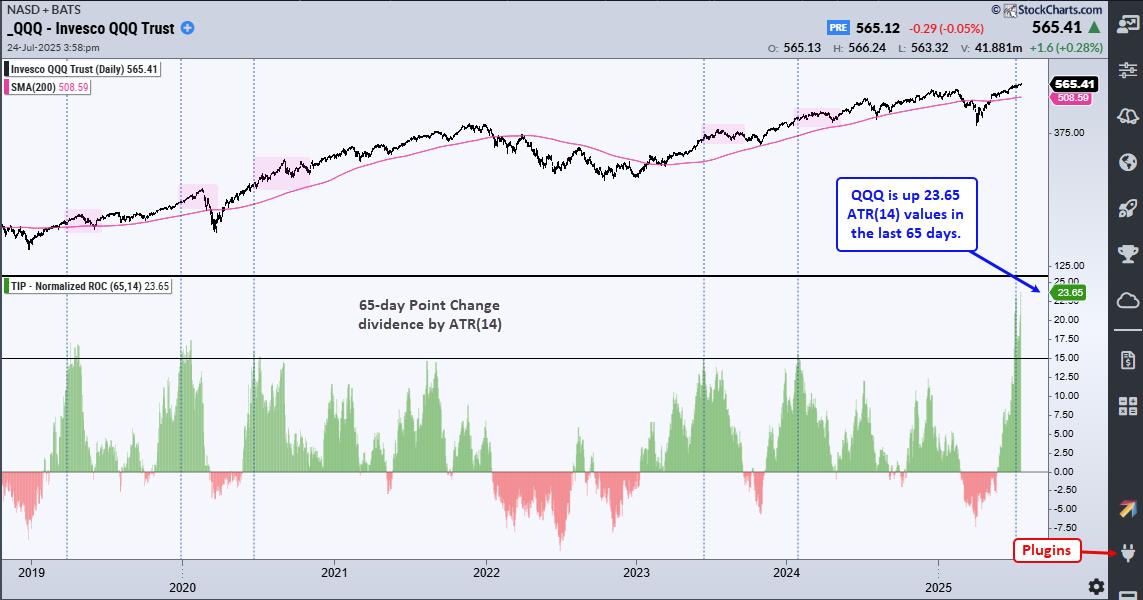Holiday Shopping Bonanza: Retail Stocks You Need to Watch

The holiday season and discretionary spending can be synonymous, ringing in a boom in retail profits. And with Halloween in the rearview mirror, it's time to strategize a few killer plays in the retail arena.
Perhaps it's no coincidence that, upon running a StockCharts Technical Rankings (SCTR) report using the US Industries menu, the Dow Jones US Broadline Retail Index ($DJUSRB) emerged among the top outperformers with an impressive score of 98.9 (see below). The holiday shopping season has started, so it's worth looking more closely at this industry. Retailers in this industry have diverse products and services that work across several sectors.
CHART 1: US INDUSTRIES SCTR RANKING. $DJUSRB ranked second in the US Industries category.Chart source: StockCharts.com. For educational purposes.
CHART 2: DAILY CHART OF $DJUSRB. The index is currently pulling back, but shows several support levels should the bounce fail to break above the most recent swing.Chart source: StockCharts.com. For educational purposes.
The index bounced off the 38.2% Fibonacci retracement level from the December 2022 low to the September 2023 high. It's outperforming the S&P 500 index ($SPX) by over 6% and looks like it's on the verge of moving even higher.
So, How Might Inflation Affect Holiday Spending?
According to recent consumer spending reports, cash is flowing out of pockets and into the hands of retailers despite inflation and mounting household debt. "Borrow and spend freely" seems to be the main theme as we head toward the end of 2023.
Still, you must consider the toll that inflation may eventually have on consumers' spending pockets, especially when it comes time to play Santa Claus. And that makes the Dow Jones US Broadline Retailers Index particularly sturdy this holiday season.
In 2022, AMZN took the largest share of holiday shopping (around 41%). It's also a large component of the $DJUSRB. Looking at the daily chart of AMZN below, you can see that the stock is outperforming the S&P 500 index ($SPX) by about 29%. It also has a strong SCTR score.
CHART 3: DAILY CHART OF AMZN. The recent slide in AMZN's stock price suggests that buying momentum may be slowing.Chart source: StockCharts.com. For educational purposes.
Though AMZN has pulled back, it appears to be clawing to challenge its September high. However, there's a deceleration in buying pressure, and you can view this more clearly if you look at the Chaikin Money Flow (CMF) in the lower chart panel. AMZN bounced strongly off the 200-day SMA line and broke above its most recent swing high of 134.50. It will have to challenge its 2023 high of 145.85 if its uptrend is to remain valid.
Let's look at some of the other US large retailers, starting with Walmart (WMT).
CHART 4: DAILY CHART OF WMT. The stock price is about to challenge its all-time high, and the CMF shows that buying pressure is still strong.Chart source: StockCharts.com. For educational purposes.
WMT, too, is outperforming the S&P 500, and the buying pressure, as exhibited by the CMF, concurs with this reading in momentum. Though WMT's price appears to be pulling back, it has several levels of support, including its 100-day and 200-day SMAs before its 50% Fib retracement. If WMT breaks above 165.75, it will have reached record highs, and right now, it looks poised to break above that level.
Like WMT, Costco (COST) benefits from a diverse suite of private-label products and economies of scale, allowing it to control costs better and maximize profits.
CHART 5: DAILY CHART OF COST. Investors seem indecisive about accumulating CSCO stock.Chart source: StockCharts.com. For educational purposes.
Technically, COST is experiencing higher levels of volatility as it approaches its all-time high above 600. It also outperformed the S&P 500, though its relative performance exhibits slight indecision. Its CMF reading is positive, but shows divergence over the last month (see the flat blue line on the CMF and compare it to Costco's rising trajectory, leading to its pullback and the following fluctuations).
Although COST appears to have bounced off its 100-day SMA, if it falls further, it has plenty of technical support between 510 and 530, where the 38.2% and 50% Fib retracements are clustered along with the 200-day SMA.
The stock price for Target (TGT) presents a different scenario. Amid a high-interest rate environment, mounting theft, and, particularly, a strong consumer backlash against certain products, TGT shows the most epic falling knife scenario (see chart below) among the largest retail giants. Still, it's an arguably solid company with a diverse portfolio of cost-competitive offerings.
CHART 6: DAILY CHART OF TGT. Ouch! However, the selling pressure looks like it's drying up. If it breaks out to the upside, its reversal faces many headwinds.Chart source: StockCharts.com. For educational purposes.
It's difficult to predict if the stock price has bottomed, but certain levels can help you gauge its advance and momentum once it begins to show signs of recovery. And the holiday season may provide the catalyst for TGT's upside reversal.
TGT is caught within tight consolidation between roughly 106 and 113.50 after a 42% plunge from its 2023 high of 177.50. Its SCTR score of 13 and -38% underperformance against the S&P 500 underscore the severity of TGT's drop. Any early signs of a recovery would begin with a close above resistance at 113.50. The CMF indicator paints a slightly optimistic picture of this likely upside break as selling pressure recedes, and buying activity sends the indicator above the zero line for the first time in four months.
But even if TGT bulls attempt to rally the stock, it has multiple resistance levels. Drawing a Fibonacci retracement from its 2023 peak to its lowest point, you can expect resistance between 132.50 (38.2%) and 140 (50%), a range in which the 200-day SMA will likely be met. Also, 125 and 137.50, the bottom and top of a previous rectangle formation, will likely provide additional resistance, adding to TGT's technical headwinds (not to mention the consumer-driven headwinds that played a significant part in its near-term demise).
Actionable Levels
AMZN, WMT, and COST are all prone to pullbacks, while TGT awaits signs of a potential reversal. Each stock presents different technical scenarios, momentum profiles, and potential support levels. Where you choose to buy (if you're bullish) depends on your level of aggressiveness and means of (bullish) confirmation. Fibonacci and SMA levels (as well as swing points) also present different stop-loss scenarios that can be trailed should you find yourself on the right side of the market.
The Bottom Line
As we enter the holiday season, retail stocks will likely take center stage. The Dow Jones US Broadline Retail Index ($DJUSRB) shines with a robust SCTR score. Its biggest component, Amazon (AMZN) faces challenges. Other large retailers show different scenarios—Walmart's gaining ground, Costco is wavering, and Target is eyeing a comeback.
Add these four retail stocks to your StockCharts ChartLists and set alerts at the possible support and resistance levels shown in the above charts.
Disclaimer: This blog is for educational purposes only and should not be construed as financial advice. The ideas and strategies should never be used without first assessing your own personal and financial situation, or without consulting a financial professional.




